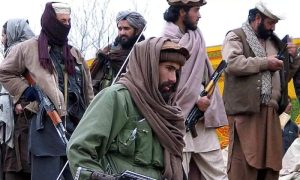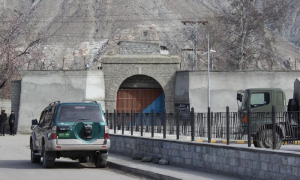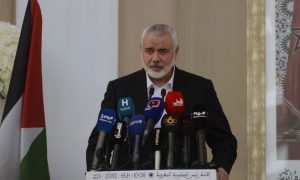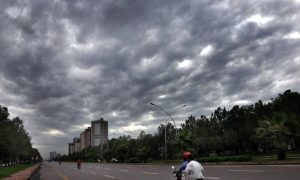Once gone into the background after military operations against the militant groups across the regions along the Afghan border, the banned groups returned with more force to attack security forces since the Taliban took the reins of Afghanistan in August 2021. Contrary to the high hopes attached by Islamabad to have peace at the western border, the situation has turned into a challenge at the diplomatic front.
Thousands of Pakistani militants, along with their families, fled to Afghanistan when the Pakistan Army had launched a military operation known as the mother of all operations – Zarb-i-Azb, in the then-tribal district of North Waziristan in 2014 to take back control of the region from the banned militant groups included Tehreek-i-Taliban Pakistan, a local group of Hafiz Gul Bahadar, al Qaida and some groups associated with the Afghan Taliban. North Waziristan district, which is now part of Khyber Pakhtunkhwa after the merger of FATA in 2018, is close to the Afghan border.
Thousands of people were forced to leave the district and had become internally displaced or IDPs, however, several thousand, believed to be the Pakistani militants and their families, fled to Afghanistan to take refuge. Zarb-i-Azb was the last full-fledged military operation to dislocate the militant groups; however, the threat remained there as now the militant groups have been active to carry out their terrorist attacks inside Pakistan.
It is widely believed that the Pakistani militant groups have reorganized its structure by buying time to have a ceasefire in 2021-22 after the Afghan Taliban mediated peace negotiations. As feared that the phase followed by the failure of peace talks, the militants had launched terrorist attacks in Pakistan with a focus in Khyber Pakhtunkhwa and Balochistan.
The top civilian and military leadership has been publicly alleging Afghanistan under the Taliban for this latest spike in terrorist attacks. The alleged cross-border attacks have become a test case for Kabul to help Pakistan overcome this issue. Pakistan and the Taliban officials have been frequently in contact to have a workable and acceptable solution of the militancy that has been posing a serious threat to the security in Pakistan’s western districts.
The Taliban senior officials have been denying the allegations leveled by Pakistan, as the Afghan soil has been using against Pakistan. The acting foreign minister Amir Khan Muttaqi once reacted to the allegations as saying, “The militancy is Pakistan’s internal and homegrown issue, and Islamabad should resolve it internally.” However, the Afghan Taliban acknowledges the issue, but call the Pakistani militants as ‘Pakistani refugees’, displaced by operations in Pakistan.
Pakistan recently appointed special envoy for Afghanistan career Ambassador Asif Durrani has visited Kabul, which is his first visit since he took charge and also after the deadly terrorist attack on Pakistani security forces in the Zhob district of Balochistan. In the terrorist attack, some 12 soldiers were killed and many injured. The attack was claimed by a little-known militant group – Tehreek-i-Jehad-i-Pakistan, but also by the former Jamaat ul Ahrar, which is now part of the banned TTP.
Ambassador Durrani, in his three-day visit to Kabul, met with the acting Afghan foreign minister Amir Khan Muttaqi and senior leadership of the interim government. In his meeting, according to Abdul Qahar Balkhi, spokesman of the foreign ministry, a number of issues of mutual interest were discussed. “Now there is peace in Afghanistan that could help improve bilateral cooperation between the two countries. There will be better economic and trade cooperation between Afghanistan and Pakistan,” Mr. Muttaqi was cited as saying in his meeting with Ambassador Asif Durrani.
On the issue of using Afghan soil by militants against Pakistan, Muttaqi pledged, “Afghans will not harm anyone. We are not allowing anyone to use our soil against other countries. We always are committed to work for regional peace and security.”
In the wake of the deadliest terrorist attack, Pakistan’s Army Chief General Syed Asim Munir has reminded to Kabul to stick to its commitments under the Doha peace deal and not allow terrorists to use Afghan soil against other countries. Pakistan’s Defence Minister Khwaja Asif alleged the attack on security forces in Zhob, Balochistan, as planned inside Afghanistan. However, Zabihullah Mujahid, a key spokesman of the Afghan Taliban, denied the allegations and reaffirmed Kabul’s assurance not to allow anyone to use Afghan soil against any country. But Mujahid stirred a new controversy by saying, “We have signed the Doha peace deal with the USA, but we are committed not to allow our soil against the neighbors, including Pakistan.”
In responding to Mujahid’s statement, Khwaja Asif said in his tweet, “A fair interpretation of Kabul’s statement. Irrespective of Afghanistan’s stance, Pakistan stands resolute to uprooting terrorism from its soil, whatever the source.” “This is regardless of whether or not Kabul has the will to reign in militants from within its borders.”
The issue has become much more complicated after both Afghanistan and Pakistan publicly traded allegations. Now some diplomatic efforts are underway to defuse the tension and move forward. Sources privy to the visit of Pakistan Special Representative Asif Durrani’s visit to Kabul, he discussed the issue with the Taliban high-ups and communicated the message with substantial evidences and a way out to revive the relations.
Kabul is denying the presence of the Pakistani Taliban in Afghanistan but reports emerging from Afghanistan revealed a number of militant groups have been active as a number of militant commanders were killed by unknown attackers. A senior TTP commander and head of former Jamaat ul Ahrar Omar Khalid Khorasni was killed in the eastern Afghan province of Khost last year, and two other commanders of his groups were recently gunned down in Afghanistan. There were unverified reports as three Afghans were allegedly involved in the Zhob terrorist attack.
Pakistan and Afghanistan have agreed in the Afghan foreign minister Amir Khan Muttaqi’s 4-day visit to Islamabad in recent months to relocate Pakistani militants to the areas away from the Pak-Afghan border. Zabihullah Mujahid has also confirmed this development, but little progress is seen on the issue.
Reports from the banned TTP say, there is resistance to this understanding between Kabul and Islamabad, and so far, they have not been taken on board. Afghan Taliban is also facing multiple challenges within its ranks to take action against the Pakistani Taliban, as they have been allies for almost two decades to fight against the US-led Nato forces.
The issue to resolve cross-border attacks is not as easy as believed by some. There are serious challenges. There is no progress or no more peace negotiations. Zabihullah Mujahid, in his recent interview, stated that the Afghan Taliban is no more facilitating peace talks between Pakistan and the banned TTP. How to move forward to have brotherly relations with the Taliban to avoid any worst case scenario is a gigantic task, but engagements and regular high-level contacts between the two sides could have lasting effects on the relations.























